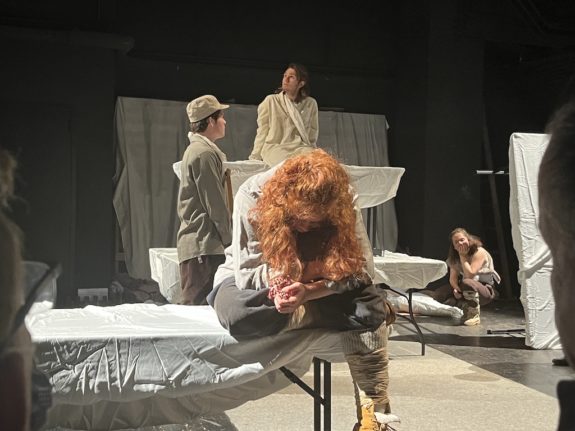On Saturday, Charlie Bonkowsky attended KCST’s performance of Henry IV, Parts One and Two, in the Lerner Blackbox Theater.
The two plays of Henry IV deal with bloody war and the coming-of-age of an unruly young prince. In Part One, Henry IV has just ascended to power, but already rebellion brews among his noble court, and breaks out into open fighting over the treatment of hostages. Meanwhile, Prince Hal, the future Henry V, is sleazing it through taverns, with the companionship of the unscrupulous—but comedic—knight, John Falstaff. But as the rebellion grows, Hal reunites with his father and is given command of an army. At the battle, the king offers generous terms to Harry Percy, the young prince who leads the rebels; but his advisors keep these terms from Percy, and battle is joined, where Hal kills Percy.
In Part Two, the rebellion continues, but is undone by Hal’s younger brother, Prince John. Henry IV is sick, and still believes that Hal is unsuited for kingship; however, on his deathbed, the king manages to reconcile with Hal, and dies believing Hal will make a good king. Falstaff, who continues to drink and cavort among a cast of unsavory characters, believes his old friendship with Hal will be well utilized when the prince becomes king; but the prince, in becoming more kingly, must reject his old friend.
KCST’s production saw the play produced in the trenches of France, 1917, by a band of American soldiers looking—as KCST’s original production notes put it—to “stave off fear and boredom.” As the soldiers play dice and cards under the buzz of planes, the soldier Jim (Luke Gardiner, CC ’25) throws a few copies of the script on a nearby wooden block and proposes they perform it. Most of the cast is reluctant, but after the first few scenes, and the antics of Moody (Morgan Johns, GS ’25) as Falstaff, they jump enthusiastically into their roles. Johns’ performance of Moody-as-Falstaff is stellar, playing up the role of the consummate coward, drinker, and lovable rogue for all it’s worth. The tavern scene, where Falstaff describes his robbery, which was actually committed earlier by Prince Hal, is Shakespearean comedy at its best.
Intermission, between Parts One and Two, comes with a flash of red lighting and the boom-boom-boom of artillery. When we reunite with the cast for Part Two, it’s with a much more subdued atmosphere. Moody snaps at Jim that “we don’t have a prince anymore!”—a casualty of that bombardment. Jim, leaning heavily on a crutch, tells Moody only that the boys want to keep the play going, and so they will.

To me, the play hit its stride in that second act, where the realities of war have clearly hit home for all the soldiers—especially Moody, who’s sunk into a deep depression and must be roused from it to play the comic Falstaff, and Jim, limping angrily between the hospital beds to direct the play—where the blood and grime smeared on their faces is no longer just set dressing. Props to the costuming/makeup department for that, by the way: it looked very realistic, and really helped sell the atmosphere of First World War trenches.
For the same reason, part of the first act felt like a missed opportunity. The large battle sequence of Part 1, between the armies of Prince Hal and Harry Percy, could have been averted but for the actions of the scheming Earl of Worcester, who lies about Henry IV’s peace terms to Percy, and in doing so drives the young prince to battle and his doom. I felt as though that scene, and those implications, could have meant more to a bunch of soldiers similarly fighting over a few miles of no-man’s-land because of the actions and treaties of noblemen.
Final thoughts: a wonderful production overall, with great performances by all the actors involved. The choice of setting and frame story really reinvigorated the story, and made me think about Henry IV in a way I hadn’t before.
Henry IV Title Card via KCST program
Hospital Scene via Charlie Bonkowsky


 0 Comments
0 Comments